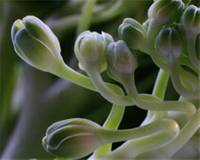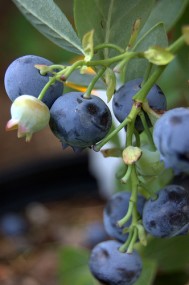- Fitness (19)
- News & Reviews (25)
- Nutrition (20)
- Science (10)
- Supplements (6)
- Technologies (8)
- The Arts (9)
Antibacterial Personal Care Products Are Linked to Allergies in Children
June 20th, 2012
 From Science Daily (June 19, 2012) This study gives us yet another reason to use more natural products! Cathie— Exposure to common antibacterial chemicals and preservatives found in soap, toothpaste, mouthwash and other personal-care products may make children more prone to a wide range of food and environmental allergies, according to new research from Johns Hopkins Children’s Center. Results of the NIH-funded study are published online ahead of print June 18 in the Journal of Allergy and Clinical Immunology.
From Science Daily (June 19, 2012) This study gives us yet another reason to use more natural products! Cathie— Exposure to common antibacterial chemicals and preservatives found in soap, toothpaste, mouthwash and other personal-care products may make children more prone to a wide range of food and environmental allergies, according to new research from Johns Hopkins Children’s Center. Results of the NIH-funded study are published online ahead of print June 18 in the Journal of Allergy and Clinical Immunology.
Using existing data from a national health survey of 860 children ages 6 to 18, Johns Hopkins researchers examined the relationship between a child’s urinary levels of antibacterials and preservatives found in many personal-hygiene products and the presence of IgE antibodies in the child’s blood. IgE antibodies are immune chemicals that rise in response to an allergen and are markedly elevated in people with allergies.
“We saw a link between level of exposure, measured by the amount of antimicrobial agents in the urine, and allergy risk, indicated by circulating antibodies to specific allergens,” said lead investigator Jessica Savage, M.D., M.H.S., an allergy and immunology fellow at Hopkins. Continue reading »
Better Than Broccoli?
September 4th, 2011
 By Dr. John Dempster: Broccoli is part of the powerhouse brassica family of vegetables. Broccoli contains important phytochemicals that are released when they’re chopped, chewed, fermented, cooked or digested. The substances are released then break down into sulphorophanes, indole-3-carbinol and D-glucarate, which all have a specific effect on detoxification.
By Dr. John Dempster: Broccoli is part of the powerhouse brassica family of vegetables. Broccoli contains important phytochemicals that are released when they’re chopped, chewed, fermented, cooked or digested. The substances are released then break down into sulphorophanes, indole-3-carbinol and D-glucarate, which all have a specific effect on detoxification.
Broccoli sprouts can actually provide more benefit than regular broccoli as they contain 20 times more sulfurophane. Add these to your salads and get creative with them in your meals.
What do Broccoli Sprouts have in common with Beet Root, Sea Vegetables, Dandelions, Flax Seeds, Lemons, Garlic, Artichokes, Tumeric & Apples? All are natural, powerful detoxifiers and simple to add to our daily diets!
Healing Properties of Broccoli Sprouts: Continue reading »
Filed under Nutrition | Comments Off on Better Than Broccoli?NutritionFacts.Org
August 29th, 2011
What’s better for you than green tea? Cold-steeped green tea! Here is great info about antioxidants in tea, and more:
There is much more research-based information on Dr. Michael Gregor’s comprehensive website: NutritionFacts.Org — Meet Dr. Gregor:
Lose weight sleeping, supress cancer growth, decrease inflamatory markers, destroy cholesterol, lower risk of heart attack — with these tasty snacks? Continue reading »
Filed under Nutrition | Comments Off on NutritionFacts.OrgHarvard: Coffee Cuts Cancer Risk
May 29th, 2011
 This article gives us reason to drink coffee, but I don’t recommend the six cups mentioned in the study — that much can cause other problems!
This article gives us reason to drink coffee, but I don’t recommend the six cups mentioned in the study — that much can cause other problems!
By Roni Caryn Rabin for the New York Times: If that’s java in your cup, drink up. A new study says that men who are heavy coffee drinkers are at lower risk for prostate cancer.
As part of the Health Professionals Follow-Up Study, Harvard scientists followed 47,911 men who periodically described their coffee intake. The researchers found those who consumed six or more cups a day were almost 20 percent less likely to develop prostate cancer over two decades than those who drank none.
More important, the heavy coffee drinkers were 60 percent less likely than the non-drinkers to develop a lethal form of the disease. Even men who drank just one to three cups of coffee benefited: They were nearly 30 percent less likely to develop lethal prostate cancer, the study said.
It did not matter whether the coffee was caffeinated or decaffeinated. (Remember that decaf is more acidic than regular, so regular makes sense for those with reflux or heartburn, or those trying to maintain an alkaline diet. With palpitations or a heart condition, decaf may be better.– Cathie) Continue reading »
Filed under Nutrition | Comments Off on Harvard: Coffee Cuts Cancer RiskYour Brain on Blueberries
January 16th, 2011
 From Scientific American: Chemical compounds common to berries, tofu, tea and other foods can shore up memory and boost brainpower.
From Scientific American: Chemical compounds common to berries, tofu, tea and other foods can shore up memory and boost brainpower.
What is blue, sweet and juicy and may help ward off those nagging memory lapses? If you guessed blueberries, you would be right… they may protect our brain.
Emerging research suggests that compounds in blueberries known as flavonoids may improve memory, learning and general cognitive function, including reasoning skills, decision making, verbal comprehension and numerical ability. In addition, studies comparing dietary habits with cognitive function in adults hint that consuming flavonoids may help slow the decline in mental facility that is often seen with aging and might even provide protection against disorders such as Alzheimer’s and Parkinson’s.
To date, scientists have identified more than 6,000 flavonoid-containing foods. They are widely distributed in fruits and vegetables, cereal grains, cocoa, soy foods, tea and wine.
How much do we need? A Cincinnati study found a 30% improvement in a group of adults older than 75 with mild memory loss who drank two cups of blueberry juice a day (the equivalent of five cups of blueberries). One study in England asked peope to add flavonoid containing foods to their meals: either soy products, supplements (Gingko biloba or pine bark extract) or a cocoa-containing beverage. Flavonoid consumption improved cognition and fine motor skills. Amounts needed to produce the improvements? One and a half cups of tofu or two cups of soy milk, 120 mg. of gingko, 150 mg. of pine bark extract, or 172 mg of cocoa flavonoids (the equivalent of 10.5 ounces of dark chocolate).
But wait–these studies give single-source quantities! If you have flavonoids from a variety of sources you’ll need moderate amounts of each one. The bottom line: eat your fruits and vegetables!
Article (behind a paywall)
Filed under News & Reviews, Nutrition | Comments Off on Your Brain on Blueberries



